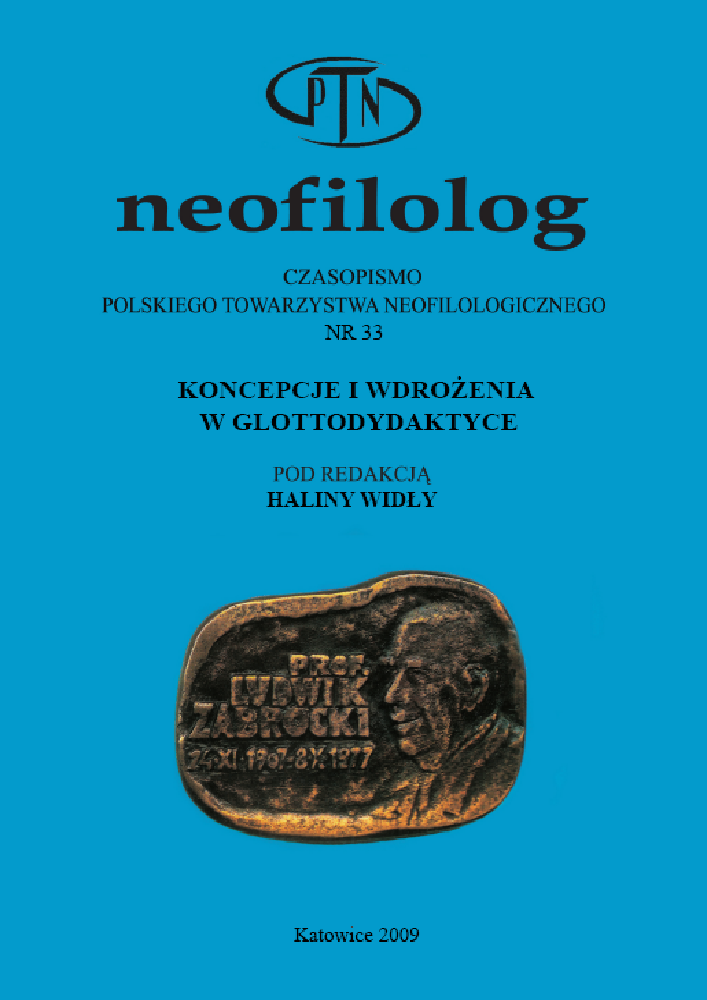Résumé
The main goal of this article is to describe the legal status and situation of disabled learners in Poland, the UK and in other European countries. The author wishes to analyze whether the trends advocated by the principles of Political Correctness (PC) have influenced the language used in the educational context, and, in particular, towards students of special education needs (SEN). The article attempts to demonstrate that neither English nor Polish are sufficiently polite in terms of describing, categorizing, evaluating or naming all the learners, who, owing to their mental or physical impairment, have Special Educational Needs.
Références
Allan, K. and K. Burridge. 1991. Language Used As Shield and Weapon. New York: Oxford University Press.
Bańko, M. 2005. Słownik Peryfraz czyli wyrażeń omownych. Warszawa: Wydawnictwo Naukowe PWN.
Dąbrowska, A. 1993. Eufemizmy współczesnego języka polskiego. Wrocław: Wydawnictwo Uniwersytetu Wrocławskiego
Dąbrowska, A. 2005. Słownik Eufemizmów Polskich czyli w rzeczy mocno, w sposobie łagodnie. Warszawa: Wydawnictwo Naukowe PWN.
Grodziński, E. 1980. Wypowiedzi performatywne. Z aktualnych zagadnień filozofii języka. Warszawa: Wydawnictwo PWN.
Kita, M. 2005. Językowe rytuały grzecznościowe. Katowice: Wyższa Szkoła Zarządzania Marketingowego i Języków Obcych w Katowicach.
Marcjanik, M. 2001. ”Etykieta językowa” w Współczesny język polski. Lublin: UMCS.
Marcjanik, M. 2007. Grzeczność w komunikacji językowej. Warszawa: Wydawnictwo Naukowe PWN.
McMinn, J. 2006. Supporting Children with Speech and Language Impairment and Associated Difficulties. Continuum: London.
Krasowicz-Kupis,G. i K. Wiejak. 2008. Skala Inteligencji Wechslera dla Dzieci (WISC-R) w Praktyce Psychologicznej. Warszawa: Wydawnictwo Naukowe PWN.
Mazińska, M. 2004. Polityka Edukacyjna Unii Europejskiej. Warszawa: Wydawnictwa Szkolne i Pedagogiczne Spółka Akcyjna.
Rees, N. 1994. The Politically Correct Phrasebook. What they say you can and cannot say in the 1990s. London: Bloomsbury.
Rees, N. 2006. A Man about a Dog. Euphemisms & Other Examples of Verbal Squeamishness. London: Harper Collins Publishers.
Rzeżnicka-Krupa J., „Językowy obraz niepełnosprawności (komunikat z badań)”. W: Integracja osób niepełnosprawnych, (red.) Kazanowski Z., Osik-Chudowolska D., Wyd. UMCS, Lublin 2003, 87 – 88.
Strong, J. and M. Flanagan. 2005. AD/HD For Dummies. Indianapolis: Wiley Publishing, Inc.
Waterhouse, S. 2000. A Positive Approach to Autism. London: Jessica Kingsley Publishers Ltd.
Woodford, K. and G. Jackson (eds. et. al.) 2003. Cambridge Advanced Learner’s Dictionary. Version 1.0 on CD-Rom based on the printed edition of Cambridge Advanced Learner’s Dictionary. Copenhagen: Cambridge University press.
INNE:
Smyth, B. “How do we meet the challenge of diversity?” in SCAN vol. 24 no.3 August 2005; http://www.schools.nsw.edu.au/media/downloads/schoolsweb/studentsupport/programs/disability/challenge.pdf DW 15.11.2007.
Ustawa z dnia 7 września 1991 r. o systemie oświaty (tekst jednolity Dz. U. z 1996 r., Nr 67, poz. 329 z późniejszymi zmianami
The Disability and Discrimination Act (1995)
Children Act (1989),
The Education Act (1996)
Special Education Needs Code of Practice (2001)
Licence
© Iwona Dronia 1970

Ce travail est disponible sous licence Creative Commons Attribution - Pas de Modification 4.0 International.
Auteurs :
Les auteurs de textes acceptés pour publication dans la revue Neofilolog sont tenus de remplir, signer et renvoyer à l'adresse de la rédaction, un accord sur l'octroi d'une licence gratuite pour les œuvres, avec obligation d'accorder une sous-licence CC.
En vertu de cet accord, les auteurs des textes publiés dans la revue Neofilolog accordent à l'Université Adam Mickiewicz de Poznań une licence non exclusive et gratuite et permettent l'utilisation de la sous-licence Creative Commons Attribution-NoDerivatives 4.0 International (CC BY-ND 4.0).
Les auteurs se réservent le droit de disposer librement de l'œuvre.
Utilisateurs :
Les utilisateurs d'Internet intéressés ont le droit d'utiliser les œuvres publiées à partir de l'année 2017 sous réserve des conditions suivantes :
- reconnaissance de la qualité d'auteur - l'obligation de fournir des informations sur la qualité d'auteur, le titre, la source (liens vers l'œuvre originale, DOI) et la licence, ainsi que l'œuvre distribuée ;
- sans créer d'œuvres dérivées - l'œuvre doit être conservée dans sa forme originale, p. ex. les traductions ou les interprétations ne peuvent être distribuées sans le consentement de l'auteur.
Tous les textes publiés sont soumis au droit d'auteur.
Autres :
L'Université Adam Mickiewicz de Poznań se réserve le droit à la revue dans son ensemble (mise en page, forme graphique, titre, conception de la couverture, logo, etc.).
.
